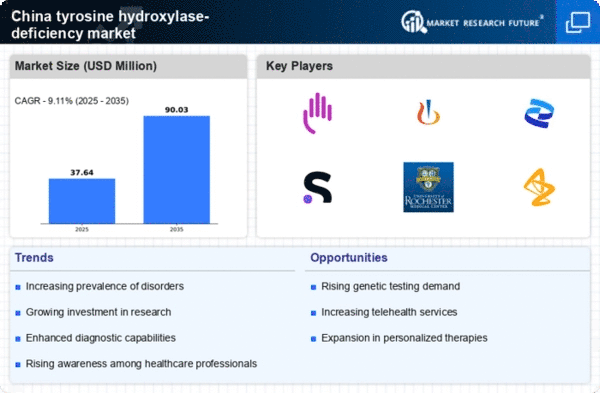Advancements in Genetic Research
Recent advancements in genetic research are significantly impacting the tyrosine hydroxylase-deficiency market. In China, ongoing studies are uncovering the genetic underpinnings of this disorder, which may lead to the development of targeted therapies. The potential for gene therapy and personalized medicine is becoming more pronounced, as researchers explore innovative treatment options that could address the root causes of tyrosine hydroxylase deficiency. This research is supported by increased funding from both public and private sectors, with investments reaching approximately $200 million in 2025. As these advancements continue, they are likely to attract pharmaceutical companies to invest in the development of new therapies, thereby expanding the market landscape and offering hope to affected families.
Increasing Awareness of Rare Diseases
The rising awareness of rare diseases, including tyrosine hydroxylase deficiency, is a crucial driver for the tyrosine hydroxylase-deficiency market. In China, healthcare campaigns and educational initiatives are increasingly focusing on rare genetic disorders. This heightened awareness is likely to lead to earlier diagnosis and treatment, which could enhance patient outcomes. As more healthcare professionals recognize the symptoms and implications of tyrosine hydroxylase deficiency, the demand for diagnostic tests and treatment options may increase. Furthermore, the Chinese government has been promoting awareness through various health programs, which could potentially lead to a market growth rate of around 15% annually in the coming years. This trend indicates a shift towards prioritizing rare diseases in healthcare discussions, thereby expanding the market for related therapies and interventions.
Government Support and Funding Initiatives
Government support and funding initiatives play a pivotal role in shaping the tyrosine hydroxylase-deficiency market. In China, the government has recognized the need for enhanced healthcare services for rare diseases, leading to increased funding for research and treatment programs. Initiatives such as the Rare Disease Fund, which allocates approximately $50 million annually, aim to support research and improve access to therapies for patients. This financial backing is likely to stimulate innovation within the market, encouraging pharmaceutical companies to develop new treatments. Additionally, the government's commitment to improving healthcare infrastructure may facilitate better access to diagnostic services, further driving market growth. As a result, the overall landscape for tyrosine hydroxylase deficiency is expected to evolve positively in the coming years.
Rising Incidence of Neurological Disorders
The rising incidence of neurological disorders in China is a significant driver for the tyrosine hydroxylase-deficiency market. As the population ages and lifestyle factors contribute to an increase in neurological conditions, the demand for effective treatments is likely to grow. Tyrosine hydroxylase deficiency, being a rare genetic disorder that affects neurotransmitter synthesis, falls within this broader category of neurological issues. Recent studies indicate that the prevalence of such disorders may rise by 10% over the next decade. This trend suggests a growing need for specialized care and treatment options, which could lead to increased investment in the tyrosine hydroxylase-deficiency market. Consequently, healthcare providers may prioritize the development of targeted therapies to address the needs of this patient population.
Collaboration Between Research Institutions and Pharmaceutical Companies
Collaboration between research institutions and pharmaceutical companies is emerging as a vital driver for the tyrosine hydroxylase-deficiency market. In China, partnerships are forming to accelerate the development of innovative therapies and improve patient outcomes. These collaborations often involve sharing resources, expertise, and data, which can significantly enhance the research and development process. For instance, joint ventures may lead to the creation of new treatment modalities that specifically target the biochemical pathways affected by tyrosine hydroxylase deficiency. As these partnerships become more prevalent, they are likely to foster a more dynamic market environment, potentially increasing the number of available therapies and improving access for patients. This collaborative approach may also attract additional funding, further bolstering the market's growth potential.
















